- Home
- James A. Michener
Matecumbe
Matecumbe Read online
Matecumbe
UNIVERSITY PRESS OF FLORIDA
Florida A&M University, Tallahassee
Florida Atlantic University, Boca Raton
Florida Gulf Coast University, Ft. Myers
Florida International University, Miami
Florida State University, Tallahassee
New College of Florida, Sarasota
University of Central Florida, Orlando
University of Florida, Gainesville
University of North Florida, Jacksonville
University of South Florida, Tampa
University of West Florida, Pensacola
University Press of Florida
Gainesville · Tallahassee · Tampa · Boca Raton · Pensacola · Orlando · Miami · Jacksonville · Ft. Myers · Sarasota
Copyright 2007 by Joe Avenick
Cover photograph by Perry Hodies III
Printed in the United States of America on recycled, acid-free paper
All rights reserved
First paperback printing, 2007
Library of Congress Cataloging-in-Publication Data
Michener, James A. (James Albert), 1907–1997.
Matecumbe / James A. Michener ; afterword by Joe Avenick.
p. cm.
ISBN 978-0-8130-3152-1 (acid-free paper)
1. Florida Keys (Fla.)—Fiction. I. Title.
ps3525.i19m38 2007
813.'54—dc22 2007005304
The University Press of Florida is the scholarly publishing agency for the State University System of Florida, comprising Florida A&M University, Florida Atlantic University, Florida Gulf Coast University, Florida International University, Florida State University, New College of Florida, University of Central Florida, University of Florida, University of North Florida, University of South Florida, and University of West Florida.
University Press of Florida
15 Northwest 15th Street
Gainesville, FL 32611-2079
http://www.upf.com
Matecumbe
Contents
Chapter 1
Chapter 2
Chapter 3
Chapter 4
Chapter 5
Chapter 6
Chapter 7
Chapter 8
Chapter 9
Chapter 10
Chapter 11
Chapter 12
Chapter 13
Chapter 14
Chapter 15
Chapter 16
Afterword
Chapter 1
Mary Ann Catherine Mays was born in Pennsylvania and spent most of her childhood living on a small chicken farm just outside Pottstown. Life was hard on the farm. There were always chores to do—feed to scatter, chicken coops to clean. She always felt sorry for the chickens and their short, penned-in existence. She was attending St. Aloysius High and had almost completed her sophomore year when she decided to leave school and get married to her dad’s auto mechanic. A life of cars and garages seemed so much more exciting than chickens.
Mary Ann and Donald Pienta had four children, all girls. But immediately after their eighth anniversary, the marriage was over. Donald had disappeared—leaving Mary Ann to care for the children.
Despite severe economic hardship, Mary Ann kept the family together. After all, she was used to dealing with adversity since her childhood. She’d work odd jobs, often two or three at the same time. Occasionally, she’d get help with the bill paying from a scattering of local relatives.
Whenever her daughters would ask the inevitable question, Mary Ann would say: “We’re not poor, we’re just low income. Poor people don’t have homes. They live in cars or in barns with the farm animals. We have an apartment.”
Medical bills constituted the most frightening of Mary Ann’s expenses. For whenever Melissa, Susan, Denise, or Annie would get ill unexpectedly, all previously designed budgets had to be scuttled. The girls’ asthmatic conditions called for constant monitoring.
“I’ll barter with your doctor,” Mary Ann told her oldest, when the damp-eyed teenager expressed worry about the cost of an emergency room visit. “Your grandmom and grandpop still have lots of chickens.”
As she walked along the beachfront of the Seascaper Resort Motel, Melissa Tomlinson was relieved that no one could see the tears that she quickly wiped from her cheeks. It was a spontaneous cry, born from pleasant memories.
She had come to the Seascaper to rejuvenate her life, to put back some semblance of mental order to a psyche that had been shredded to nothingness as a result of the recent divorce.
The Seascaper had been friendly to her in the past, and so had the little town in the Florida Keys—Islamorada—on whose beaches she now walked.
The word “Islamorada” is literally translated from the Spanish as “Purple Island.” This is due, no doubt, to the wild and colorful bougainvillea that grow everywhere, as if they were the ever-present springtime dandelions that cover farmlands and suburban lawns alike in her native Pennsylvania.
The tiny town of Islamorada, covering Upper Matecumbe Key, lies about halfway between Miami and Key West. The entire island is less than a mile wide, and from Route 1, the only highway, you can see the sparkling waters of the Gulf of Mexico on one side and the Atlantic Ocean on the other.
Thousands of years ago, there were no Florida Keys. When dinosaurs roamed the mainland, these islands were hidden under the ocean. But like buried treasure, they rose from beneath the swells, gem-like, to add a tiara of sparkling beauty to the mass of warm-weather vegetation that would come to be known as Florida.
Melissa stopped walking when she reached the easternmost point of the Seascaper’s grounds, where the sandy surface ended abruptly, and a line of large black rocks, forming a jetty, separated her from the sea.
She looked briefly over her shoulder at the setting sun, its orange glow quickly disappearing into what seemed to be the far end of the ocean. This powerful spectacle always seemed to evoke an increase in her visual vocabulary.
“I hope,” she told herself, “that this will not be symbolic of the rest of my days. I am determined that all the sunshine in my life will not be limited to my past.” For after thirteen years as a faithful wife, Melissa was recently divorced from Brady Tomlinson, a tenured English teacher at the University of Pennsylvania. They had been college sweethearts who’d married two weeks after graduation—the June wedding that Melissa had always dreamed she’d have. Now, suddenly, Brady had been excised forever from her life—with the swiftness of a sharp-edged sword cutting down flowers in full bloom.
The week lying ahead of her would mark Melissa’s first vacation without Brady since she was a teenager. There was no hope of reviving their relationship. It would be like trying to calm a tiger in the rain.
“Losing Brady was like losing a pet,” Melissa had told Cammie, her best friend and fellow reference librarian. “It was just like when the veterinarian advised me to have Pops, my cat, put to sleep. That’s the feeling I had when I signed the first of the divorce papers.”
Cammie, who was Melissa’s confidante as well as her co-worker in a Philadelphia library, had never been married.
“At least now we can go to the singles bars together,” Melissa had laughed. “Being six years younger than me, though, you’ll probably get the best of what’s left out there.”
Before she could even begin to embark with Cammie on what she feared would probably be a difficult manhunt, Melissa wanted to return, alone, to Islamorada, which was, without a doubt, her most favorite place in the world. Though she had traveled extensively with Brady throughout the most popular of Europe’s tourist centers—in England, France, Italy, and Greece—her visits to Islamorada generated the most cherished memories.
In fact, Melissa had journeyed to Isla
morada even before she’d met Brady. During the spring vacation of her freshman year in college, she and three of her dormitory sisters had driven off to Islamorada on a day trip from their lodgings in Fort Lauderdale. She had come to escape then, too. The motel they were staying at in Fort Lauderdale was filled with a fraternity from the University of Michigan, which was fun at first. But two nights into their stay the police raided a party the boys were having in one of their rooms, and the whole gang was taken down to the local police station where they were all forced to spend the night. A calming junket to Islamorada was just what their frightened spirits needed before returning to college.
And with Brady, Melissa had come often to this ever-sunny, tropical isle. She suspected, however, that she enjoyed this peaceful hideaway much more than Brady did. The solitude of the island was at the core of its appeal to Melissa, and at this crucial juncture in her life, she knew that Islamorada would allow her some precious time to think. Melissa realized that she needed to be free from the distractions of the working world in order to refresh her battered soul.
She also wanted to be able to return home from this eight-day island vacation as an invigorated woman—ready to re-pursue her life’s dual goals of continued success as a reference librarian and happiness as a wife—the wife of an as-yet-unknown man who would love her for the remainder of their years together.
“The December sunshine in Florida will help my looks, too,” Melissa admitted. “I have a sexy figure, and I’m still thin—thanks to exercise, I guess. But a suntan always makes my face look just a trifle younger. And the younger I look, the younger the guys will be who’ll show an interest in me. I don’t want to get involved with a teenager, certainly, but I don’t want to attract the graybeards either.”
Melissa contented herself with the knowledge that she had always been a good-looking woman. Not as ravishing perhaps as the typical nighttime soap opera star, but close enough.
With deep-set brown eyes and pixie-like movements, despite her average height, Melissa Pienta had broken more than a few hearts in high school and college. Although she wasn’t as young and as fresh-faced as Cammie, she was far from old. And to her credit, she exuded the class of a mature, well-informed woman. It was her alert mind, and perhaps her high IQ, she concluded, that had convinced the scholarly Brady, many years ago, to ask for her hand in marriage.
Melissa knew that although Brady had an ultra-skinny, super-slight build, this absence of muscles did not detract from his being considered a handsome catch. His ready wit and the tender things he’d always say to her more than made up for his lack of brawn.
Unfortunately, just as he would always seem to become bored slightly with Islamorada after a few days of beach, water, and sun, Brady had, over the last few years, become bored with his Melissa.
“The excitement is gone from our marriage,” he’d told her, bluntly.
This boredom label that Brady had bestowed on her was the deepest hurt for Melissa. It was far from a kind comment, especially since Brady was keenly aware of Melissa’s constant battles with self-confidence.
Now he was involved with a bond trader on the New York Stock Exchange who also kept a weekend escape house outside of New Hope, Pennsylvania. I’m sure that she is anything but boring, Melissa thought to herself when the vision of Brady’s new love entered her mind.
With Brady gone, Melissa wondered what the next man in her life would look like—if there were to be a next man.
The sun had completely disappeared from the sky by the time Melissa had walked back to the tiny office of the Seascaper.
The town of Islamorada, as well as this beachfront motel, hadn’t changed much in the six years since she’d last visited. The general store with real pickle barrels was still a fixture, but it had competition now in the form of an ever-busy convenience store. A sprawling, three-story hotel and a drive-through hamburger emporium were also new. The town, though, if you could erase all traces of ocean, could pass for a sparsely populated hillside hamlet somewhere deep in West Virginia’s coal country—such were the buildings that sat alongside the oft-deserted main highway.
The rustic post office, the lone gas station, and the trailer park with the neon sign all flashed a time in history when America spun more to 45 R.P.M. than to chic corporate culture.
Melissa was amused more than annoyed when she saw that the sign she’d read earlier was still posted on the door to the Seascaper’s office.
—DON’T BE DOUR
BE BACK IN ONE HOUR
OUT FISHING FOR DINNER—
Typical of this part of the world, Melissa thought. People in the Keys may be slackers, but they’re poetic slackers. They always seem to give business a backseat to the pleasures of everyday living.
Florida, she reasoned, could be just as laid back as California claims to be, but much more earthy.
All told, it had been an hour since she’d arrived here by rental car after flying non-stop from Philadelphia to Miami. The eighty-mile drive from the airport to Islamorada had tired her slightly, and Melissa wondered how much longer it would be before she could check in and take a much-needed, refreshing shower.
But resigned now to an even further wait, thanks to the desk clerk’s fishing expedition, she sat on the fender of her car for what turned into yet another half hour. Finally, after putting her now useless sunglasses on the car’s dashboard, Melissa decided to walk along the beach toward the eastern end of the Seascaper complex.
Although the weather was far from cold, the breezes from the Caribbean rippled coolly and crisply through the palm trees, whipping the giant fronds into a hushed tune that sounded like rain but wasn’t.
Melissa’s immediate goal was the pier that jutted out some two hundred feet from the beach toward the general direction of Cuba. She had fished on this pier with Brady, catching tiny, pastel-striped relatives of sea bass known as cowfish. The water in Islamorada was so clear that during daylight hours she remembered being able to look straight through to the bottom, watching the colorful underwater life swim by and seeing an occasional fish chance a nibble on a baited hook.
Nighttime, too, offered its sensual rewards. An evening walk to the end of the pier always seemed to put Melissa into oneness with nature. She guessed it was because she was standing, and breathing, in a spot where she shouldn’t be—two hundred feet offshore and, during high tide, only inches over the water line. Here, the moonlight brightening an ocean horizon was complemented by the sound of tiny, rippling waves.
It wasn’t until she had reached the end of the pier and was staring toward clouds and stars that Melissa realized how dark it really was. She might not have found the pier at all if she hadn’t known, in advance, where to look for it. The light-starved sky was certainly no help.
“Didn’t I see small, round lights out here last time?” she asked herself. “I seem to remember little yellow bulbs attached to the upper railings.”
Suddenly, Melissa’s attention was given to the sound of a motorboat. And though her eyes were getting accustomed to the dark, she could not see a craft of any size near the pier.
While the motor’s howl continued to increase at an alarming rate, she scanned in all directions, flipping her head from side-to-side as if it were the periscope of a submarine, but she could see nothing. Melissa was holding onto the railing in fright now, which would be to her benefit. The roaring sound had become unbearably loud.
She saw it an instant before it crashed into the center of the pier, halfway between her and the beach. The boat, like the pier, had no lights. It was a speedboat, about twenty feet long.
If Melissa hadn’t been gripping the railing, the force of the impact would have thrown her into the water. Still, the crash knocked her onto the flooring of the pier, toward the opposite railing some four feet away.
As she lay there, seemingly unharmed except for a wood-scraped left elbow, she saw what remained of the speedboat go up in flames.
Righting herself, she watched in horror as the bu
rning boat cut out her only path back to shore.
Within seconds, the flames were shooting high into the air, illuminating the shoreline. Looking back toward the Seascaper, Melissa could tell that a small crowd had now begun to gather on the beach.
“Help! Help!” Melissa screamed, over and over, waving her arms. She stopped only when she realized she had been spotted, for some of those on shore were pointing back to her while others waved in recognition.
After about fifteen additional minutes of panic, worrying about the burning wood between her and safety and about whether the speedboat would explode, Melissa sighed in relief as she saw a rescue boat begin to approach. It looked like an abbreviated tugboat, wide and sturdy, complete with blinking red lights and a huge floodlight near the bow. At the same time, on the opposite side of the pier, a small fireboat appeared, hosing water on the flames.
There was only one passenger in the rescue boat, a tall man who may have seemed taller because he was standing behind a small steering wheel, which he maneuvered in front of him at thigh level. He was wearing a policeman’s jacket and slacks, a gun, and a grayish, western style hat with a huge star just above the brim. She had harbored a fear of policemen, especially southern policemen, since her college experience in Fort Lauderdale. But now, he was as welcome a sight to Melissa as John Wayne was to many a cinematic damsel. Instead of a white stallion, though, he had driven up at the helm of a police boat that seemed as brightly decorated as a Christmas tree.
“You all right, ma’am?” he queried, extending his arm, gently, to help her on board.
Melissa accepted the blanket he quickly offered, which she used to cover her now shivering shoulders. She was thankful that she was still wearing the warm winter suit she’d put on in Philadelphia for the plane ride south.
Melissa stared upward at his profile as he pointed the boat back toward land. His well-chiseled features, highlighted by the dying blaze, suggested a tough man, but his voice was compassionate.

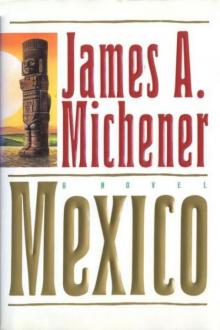 Mexico
Mexico The World Is My Home: A Memoir
The World Is My Home: A Memoir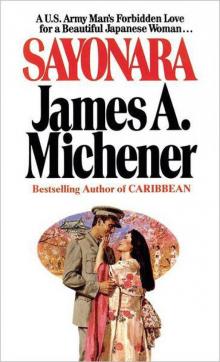 Sayonara
Sayonara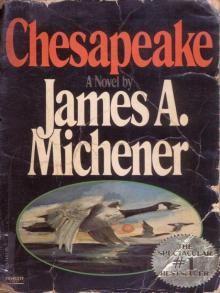 Chesapeake
Chesapeake The Novel
The Novel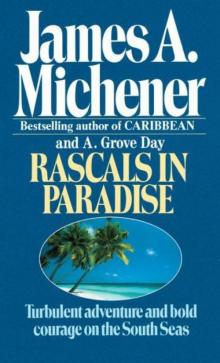 Rascals in Paradise
Rascals in Paradise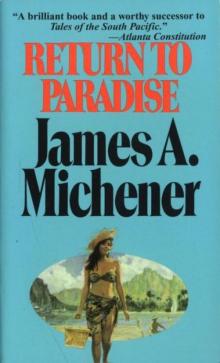 Return to Paradise
Return to Paradise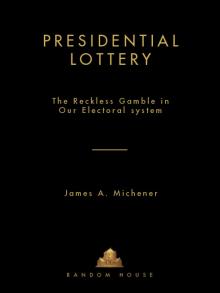 Presidential Lottery: The Reckless Gamble in Our Electoral System
Presidential Lottery: The Reckless Gamble in Our Electoral System The Source
The Source Poland
Poland Space
Space Caravans
Caravans Creatures of the Kingdom: Stories of Animals and Nature
Creatures of the Kingdom: Stories of Animals and Nature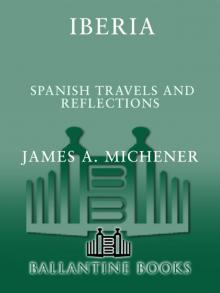 Iberia
Iberia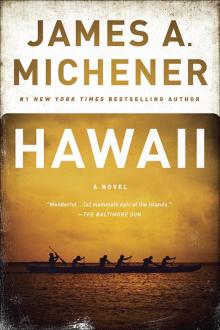 Hawaii
Hawaii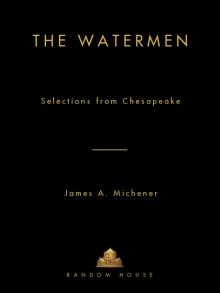 The Watermen: Selections From Chesapeake
The Watermen: Selections From Chesapeake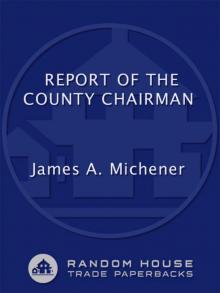 Report of the County Chairman
Report of the County Chairman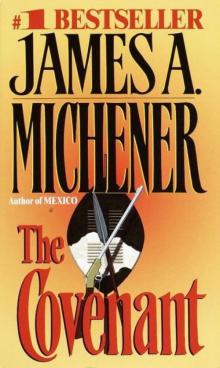 The Covenant
The Covenant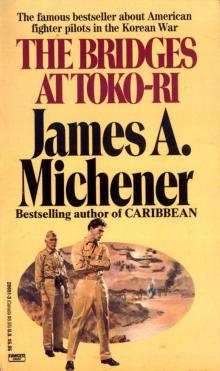 The Bridges at Toko-ri
The Bridges at Toko-ri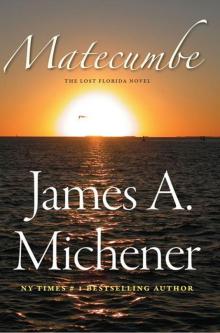 Matecumbe
Matecumbe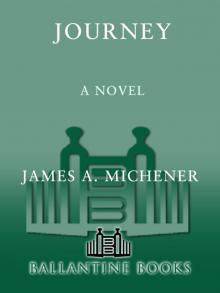 Journey: A Novel
Journey: A Novel Centennial
Centennial Sports in America
Sports in America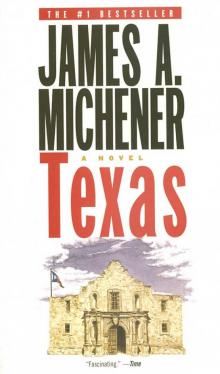 Texas
Texas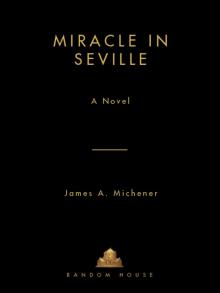 Miracle in Seville
Miracle in Seville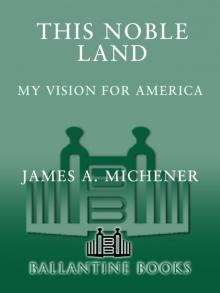 This Noble Land: My Vision for America
This Noble Land: My Vision for America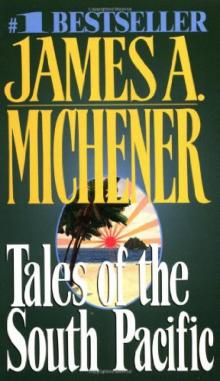 Tales of the South Pacific
Tales of the South Pacific Bridges at Toko-Ri
Bridges at Toko-Ri Space: A Novel
Space: A Novel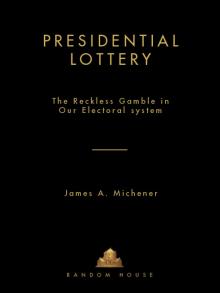 Presidential Lottery
Presidential Lottery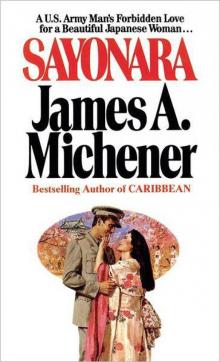 Sayonara: A Novel
Sayonara: A Novel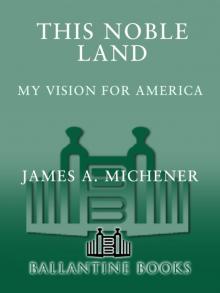 This Noble Land
This Noble Land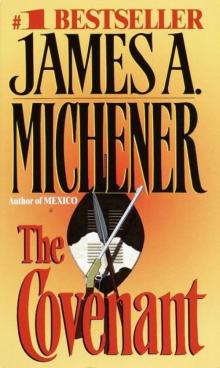 The Covenant: A Novel
The Covenant: A Novel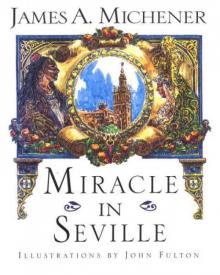 Miracle in Seville: A Novel
Miracle in Seville: A Novel The Bridge at Andau
The Bridge at Andau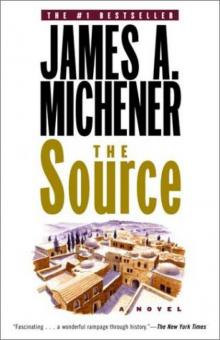 Source
Source The Source: A Novel
The Source: A Novel Journey
Journey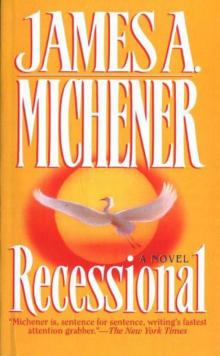 Recessional: A Novel
Recessional: A Novel Legacy: A Novel
Legacy: A Novel The Bridges at Toko-Ri: A Novel
The Bridges at Toko-Ri: A Novel Poland: A Novel
Poland: A Novel